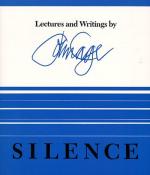
|
| Name: _________________________ | Period: ___________________ |
This test consists of 5 short answer questions, 10 short essay questions, and 1 (of 3) essay topics.
Short Answer Questions
1. In what publication did Cage's essay on Erik Satie first appear?
2. What did Dr. Suzuki eat at dinner while everyone ate curries?
3. Into what language was "Composition: To Describe the Process of Composition Used in 'Music for Piano" translated?
4. Who accompanied Cage and eight children on a trip to a zoo?
5. Who wrote "Psychology--never again"?
Short Essay Questions
1. How has Cage's process of composition evolved?
2. How does Cage go about exploring the work of each composer he mentions in "Composition as Process--2: Indeterminacy"?
3. In "Experimental Music: Doctrine," how does Cage respond when asked what he had to say about rhythm?
4. How does Cage describe the process by which he created a piece of music scored for twelve radios?
5. What advancements in music does Cage attribute to Henry Cowell?
6. What happened to Cage when he and Xenia went to New York, expecting to stay with a friend named Max?
7. What does Cage believe the future holds for sounds that are heard on a regular basis?
8. In the book's Foreword, how does Cage describe the way the writings and lectures in his book are written and presented?
9. Describe the story Cage retells of when his mother asked his father to go to church.
10. What does Cage say about finding facts on the life and work of Edgard Varese?
Essay Topics
Write an essay for ONE of the following topics:
Essay Topic 1
What ideas or people does Cage say inspired him as an artist? What techniques does the author use to convey to the reader that these ideas or people have inspired him? In other sections in Part 1, do you see traces of these influences?
Essay Topic 2
Explore the contradictory nature between Cage's desire to be random but his use of form. How does he show throughout the book that he is dedicated to randomness? What random things does he do? How might his random actions, especially in his presentation on the page, be seen as not random? Is anything really random if it is planned out in advance?
Essay Topic 3
Explore Cage's use of personal anecdotes throughout the book. What seems to be the purpose of his lecture made up of anecdotes? What reason does Cage give for including it? What purpose do the anecdotes seem to serve in this chapter and throughout the book? How do the anecdotes represent a larger idea about relationships?
|
This section contains 814 words (approx. 3 pages at 300 words per page) |

|




